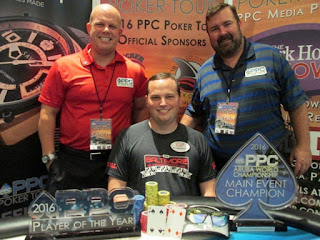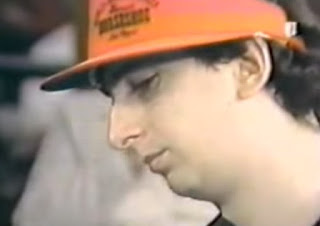 |
| Frank Abagnale: Proof that working for the law is more beneficial than working against it. |
Short stacking and game integrity may sound diametrically opposed, but before you instinctively roll your eyes, let me tell you how they can work peacefully together.
Let's start by setting the record straight, I'm not an angle shooter...I'm an opportunist. That is, I probe the system to look for exploits and vulnerabilities within the rules for personal gain. The final outcome may offend (many) players' concepts of how the game should be played and their aesthetic sensibilities, but I have learned firsthand how making it too easy to practice can create a hostile gaming environment, yet efforts to completely thwart the practice will lead to predatory play and ultimately the collapse of a delicate poker ecosystem both in NLH and Omaha.
Before considering setting your default buy-in level above 30BB, I urge you to read this article I wrote for Part Time Poker.
However, please note that in setting my sights on your Operations Team Leader/Game Integrity position, I am not advocating the creation of an environment where short stackers can thrive, but rather, a new one where the presence of professional short stackers can not exist, while simultaneously keeping the barrier of entry low for recreational players. Again, please reference the above article for a common sense (but neglected) view of how raising the buy-in even slightly too high can destroy a poker ecosystem.
Here is a brief list of my goals for your company:
I had originally wanted to propose precise examples of how I could achieve these goals, but rather, decided to hold off until our interview.
Given my long history of working outside the system to exploit it within, I will now state on record that not only am I a good candidate for this position, I am the ideal one. If the description so far isn't quite what you had in mind for the position, then you are obligated to create one :)
Let's start by setting the record straight, I'm not an angle shooter...I'm an opportunist. That is, I probe the system to look for exploits and vulnerabilities within the rules for personal gain. The final outcome may offend (many) players' concepts of how the game should be played and their aesthetic sensibilities, but I have learned firsthand how making it too easy to practice can create a hostile gaming environment, yet efforts to completely thwart the practice will lead to predatory play and ultimately the collapse of a delicate poker ecosystem both in NLH and Omaha.
Before considering setting your default buy-in level above 30BB, I urge you to read this article I wrote for Part Time Poker.
However, please note that in setting my sights on your Operations Team Leader/Game Integrity position, I am not advocating the creation of an environment where short stackers can thrive, but rather, a new one where the presence of professional short stackers can not exist, while simultaneously keeping the barrier of entry low for recreational players. Again, please reference the above article for a common sense (but neglected) view of how raising the buy-in even slightly too high can destroy a poker ecosystem.
Here is a brief list of my goals for your company:
- Create and balance an ecosystem via setting the optimal buy-in level.
- Monitor the ecosystem for potential exploits or imbalances that may be caused by rake or rewards systems.
- Eliminating or curbing the practice of using a heads up display while still offering the ability to track one's own play.
- Work to create and simulate new games with low barriers to entry in a non-predatory environment.
- Prevent the practice of multi-accounting and VPN'ing from excluded countries.
- Provide hands on and excellent customer service to both fellow employees and players alike, while closely monitoring customer input and concerns.
I had originally wanted to propose precise examples of how I could achieve these goals, but rather, decided to hold off until our interview.
Given my long history of working outside the system to exploit it within, I will now state on record that not only am I a good candidate for this position, I am the ideal one. If the description so far isn't quite what you had in mind for the position, then you are obligated to create one :)













